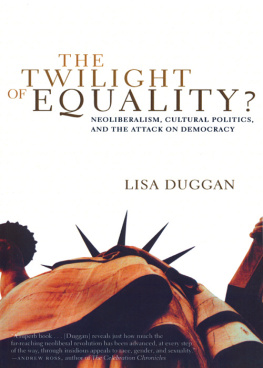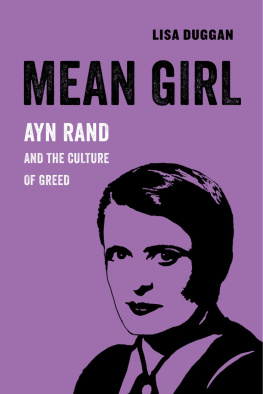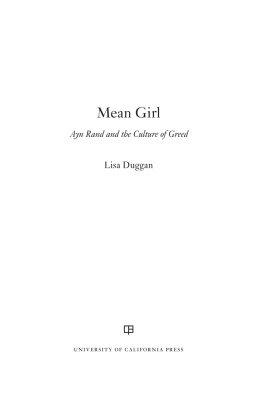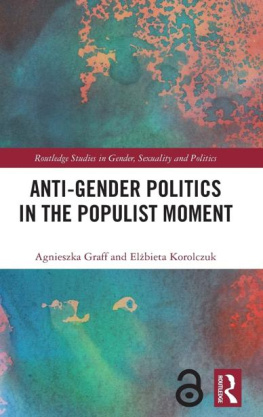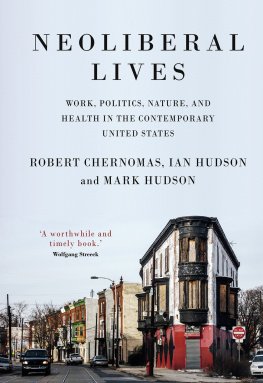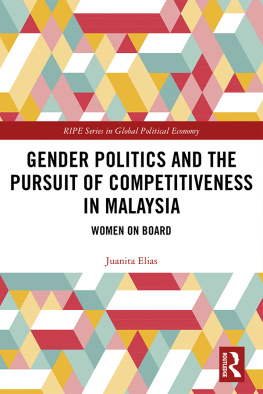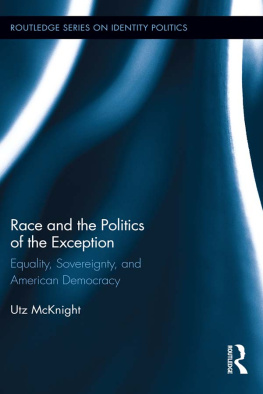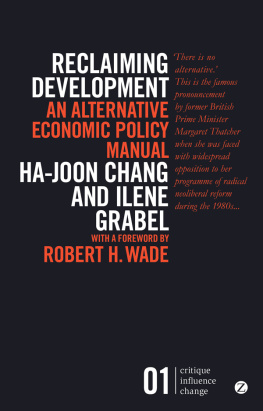
FOR HENRY ABELOVE AND CINDY PATTON
Contents
Introduction
What a long, strange trip its been.
When I graduated from high school in 1972, the United States did not appear to be in good condition. Richard Nixon was president, the U.S. was embroiled in an unjust imperialist war in Vietnam, the limitations of 1960s civil rights legislation appeared in the form of persistent, entrenched racial inequality, the worlds of work and home were sharply segmented by gender hierarchies. But in 1972, I nonetheless had reason to be optimistic. Active and expanding social movements seemed capable of ameliorating conditions of injustice and inequality, poverty, war and imperialism. In fact, social movements were producing innovative critiques of a widening variety of constraints on human possibilitythe womens liberation movement, gay liberation, lesbian feminism, black feminism, and other thriving or emerging formations joined radical labor activism, civil rights and black nationalist insurgencies, antiracist and anti-imperialist mobilizations. Despite all the internal tensions and conflicts, it also seemed possible that cross-fertilizations would incite exponential growth in the scope and impact of our shared or overlapping visions of social change. When I said I wanted to be a revolutionary, this was not received as ludicrous or sectarian, but as a declaration of affinity with those whose overlapping aspirations for equalitysocial, political, economic, and cultural equality in a global contextseemed both thrilling and attainable.
I had no idea I was not perched at a great beginning, but rather at a denouement, as the possibilities for progressive social change encountered daunting historical setbacks beginning in 1972. From the perspective of more than three decades later, it is apparent that a great sea change begun in the early 1970s led us all in directions we simply could not have imagined then. From the early 1970s, global competition and falling profit rates stirred U.S. corporate interests to mount a countermovement. This movement expanded in many directions from its base of pro-business activism, and it took many years to build; it has never been unified or stable. Yet, it has successfully opposed proliferating visions of an expansive, more equitable redistribution of the worlds resources. Beginning with the election of Ronald Reagan to the presidency and throughout the 1980s, the overall direction of redistribution of many kinds of resources, in the U.S. and around the world, has been upwardtoward greater concentration among fewer hands at the very top of an increasingly steep pyramid.
What happened? How did the forces of upward redistribution so forcefully trump the broad-based, expansive revolution toward downward redistributions that seemed so vital still in 1972? In the United States, the uneasy and uneven New Deal consensus among business, government, and big unions, built during the 1930s and more or less in place through the Great Society era of the 1960s, was dismantled. But this did not occur in order to remedy the undemocratic and antiegalitarian features of that consensus, or in order to generate greater democratic participation, material equality, cultural diversity, and good global citizenship, as many revolutionaries had hoped. Rather, the New Deal consensus was dismantled in the creation of a new vision of national and world order, a vision of competition, inequality, market discipline, public austerity, and law and order known as neoliberalism.
Tracing their descent through capital L Liberalism, as developed in Anglo-Europe since the seventeenth century, the architects of contemporary neoliberalism drew upon classical liberalisms utopianism of benevolent free markets and minimal governments. These earlier ideas provided a set of rationales, moral justifications, and politically inflected descriptions of the institutions of developing capitalism. Such institutions, and their associated economic practices and social relations, changed over time and varied across spacecapitalism has never been a single coherent system. Liberalism has therefore morphed many times as well, and has contained proliferating contradictions in indirect relationship to the historical contradictions of capitalism. In the United States during the twentieth century, the entire spectrum of mainstream electoral politics, from conservatism to domestic liberalism, has varied largely within the parameters of Liberalism. Only the far right and the left have provided illiberal or antiliberal alternatives to the overwhelming dominance of differing and conflicting forms of Liberalism in U.S. politics.
From the 1930s to the 1960s, a very limited form of welfare state liberalism, or social democracy, shaped the U.S. nation state and the political culture supporting it. The New Deal coalition defeated or marginalized antistatist conservatives (who were also Liberals in the classical sense), and absorbed or marginalized socialists and other progressive left critics of its limited version of equality within capitalism. During the 1950s and 1960s, criticism of the U.S. welfare state from both the right and the left intensified. Conservative antistatist attacks on New Deal social welfare programs mounted, as the new social movements pressed from the left for more equitable distribution of many kinds of resources. Then during the 1970s, the social movements encountered a new pro-business activism that ultimately seized the primary institutions of the state over the next two decades.
This pro-business activism, the foundation for late twentieth century neoliberalism, was built out of earlier conservative activism. Neoliberalism developed over many decades as a mode of polemic aimed at dismantling the limited U.S. welfare state, in order to enhance corporate profit rates. The raising of profit rates required that money be diverted from other social uses, thus increasing overall economic inequality. And such diversions required a supporting political culture, compliant constituencies, and amenable social relations. Thus, pro-business activism in the 1970s was built on, and further developed, a wide-ranging political and cultural projectthe reconstruction of the everyday life of capitalism, in ways supportive of upward redistribution of a range of resources, and tolerant of widening inequalities of many kinds.
Neoliberalism developed primarily in the U.S., and secondarily in Europe, in response to global changes that challenged the dominance of Western institutions. Within the U.S. specifically, one might divide the construction of neoliberal hegemony up into five phases: (1) attacks on the New Deal coalition, on progressive unionism, and on popular front political culture and progressive redistributive internationalism during the 1950s and 1960s; (2) attacks on downwardly redistributive social movements, especially the Civil Rights and Black Power movements, but including feminism, lesbian and gay liberation, and countercultural mobilizations during the 1960s and 1970s; (3) pro-business activism during the 1970s, as U.S.-based corporations faced global competition and falling profit rates, previously conflicting big and small business interests increasingly converged, and business groups organized to redistribute resources upward; (4) domestically focused culture wars attacks on public institutions and spaces for democratic public life, in alliances with religious moralists and racial nationalists, during the 1980s and 1990s; and (5) emergent multicultural, neoliberal equality politicsa stripped-down, nonredistributive form of equality designed for global consumption during the twenty-first century, and compatible with continued upward redistribution of resources.

